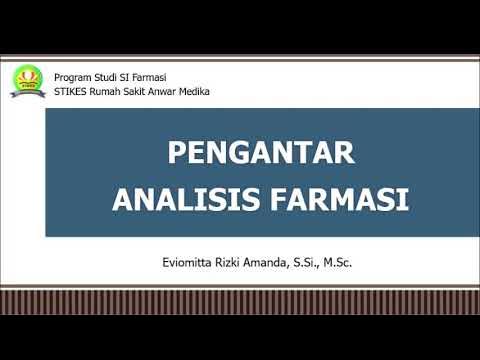Analytical Method Development & Validation
Summary
TLDRThe video script delves into analytical method development and validation, crucial for ensuring the accuracy and reliability of pharmaceutical analysis. It emphasizes the importance of these methods in measuring drug components, including active pharmaceutical ingredients (APIs), excipients, and degradation products. The process involves proving the method's suitability for its intended use, with parameters like accuracy, precision, and robustness. Adherence to ICH guidelines in GMP and GLP environments ensures the quality and consistency of analytical data, vital for drug assessment.
Takeaways
- 🔬 Analytical method development is about selecting an accurate assay to determine the composition of a formulation.
- 📊 Method validation establishes that an analytical technique is suitable for its intended use, often a crucial requirement for analytical purposes.
- 💊 Reliable and reproducible analytical methods are vital for measuring various properties of pharmaceuticals, including identity, potency, purity, and stability.
- 📈 The results from method validation help determine the quality, reliability, and consistency of analytical data.
- 🔍 Method validation parameters include accuracy, precision, linearity, specificity, limit of detection (LOD), limit of quantification (LOQ), ruggedness, robustness, and system suitability.
- 🧐 These parameters answer how well instruments can measure the drug component, ensuring the analytical method's effectiveness.
- 🛠️ The main goal of analytical method development and validation is to demonstrate that the proposed method is accurate, specific, precise, and robust for drug moiety analysis.
- 🏭 Analytical techniques are developed and validated for various components of the final drug, including APIs, excipients, degradation products, and related substances, following GMP and GLP practices.
- 🌐 The protocols and acceptance criteria are set out in the International Council for Harmonization (ICH) guidelines, ensuring a standardized approach globally.
Q & A
What is analytical method development in the context of pharmaceuticals?
-Analytical method development is the process of selecting and proving an accurate assay procedure to determine the composition of a formulation in a laboratory. It ensures that the method is acceptable for measuring the concentration of a drug moiety.
What is the purpose of method validation in analytical techniques?
-Method validation is the process of proving that an analytical technique is appropriate for its intended use, ensuring the method's reliability, accuracy, and reproducibility for analytical purposes.
Why are reliable and reproducible analytical methods important in pharmaceutical development?
-Reliable and reproducible analytical methods are essential to measure the physiochemical properties, identity, potency, purity, stability, and bioavailability of the final drug product, ensuring the quality and consistency of pharmaceuticals.
What parameters are used to explain method validation results?
-Method validation parameters include accuracy, precision, linearity, specificity, limit of detection (LOD), limit of quantification (LOQ), ruggedness, robustness, and system suitability.
How do these validation parameters answer the question of instrument performance?
-These parameters determine how well the instruments can measure the drug component, assessing the method's performance in terms of its ability to accurately and specifically detect and quantify the drug moiety.
What is the main goal of analytical method development and validation?
-The main goal is to prove that the proposed analytical method is accurate, specific, precise, and robust for the analysis of a drug moiety, ensuring that the analytical procedures are adequate for assessing drugs and their active pharmaceutical ingredients (APIs).
What are the components for which analytical techniques are developed and validated?
-Analytical techniques are developed and validated for the components of the final drug, including active pharmaceutical ingredients (APIs), excipients, drug products, degradation products, related substances, and residual solvents.
In what kind of environments are these analytical methods carried out?
-These methods are carried out in Good Manufacturing Practice (GMP) and Good Laboratory Practice (GLP) environments to ensure the highest standards of quality and safety.
What guidelines are followed during the development and validation of analytical methods?
-The protocols and acceptance criteria are set out in the International Council for Harmonization (ICH) guidelines, which provide a standardized framework for the development and validation process.
How does the ICH guideline influence the development and validation of analytical methods?
-The ICH guidelines provide a harmonized and internationally recognized standard, ensuring that the methods are developed and validated to meet global quality, safety, and efficacy requirements for pharmaceutical products.
What is the significance of proving the method's ruggedness and robustness during validation?
-Proving ruggedness and robustness ensures that the analytical method performs consistently under a variety of conditions and is not overly sensitive to small changes in parameters, which is crucial for maintaining reliable results.
Outlines

This section is available to paid users only. Please upgrade to access this part.
Upgrade NowMindmap

This section is available to paid users only. Please upgrade to access this part.
Upgrade NowKeywords

This section is available to paid users only. Please upgrade to access this part.
Upgrade NowHighlights

This section is available to paid users only. Please upgrade to access this part.
Upgrade NowTranscripts

This section is available to paid users only. Please upgrade to access this part.
Upgrade NowBrowse More Related Video

Working Principle of UV Spectrophotometer

Perbandingan Hasil Estimasi Inverse distance square dan Ordinari Kriging

Regulatory Expectations for Cleaning Validation | FDA Requirements for Cleaning Validation

Validasi Metode Part 2 - Selektifitas / Spesifisitas

ANALISIS FARMASI II: PENGANTAR ANALISIS FARMASI II

What is Analytical Chemistry | Analytical Chemistry Methods | What does Analytical Chemists Do
5.0 / 5 (0 votes)